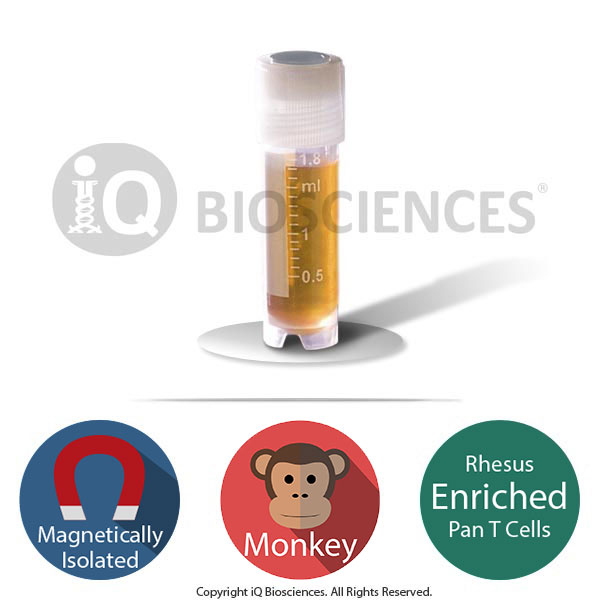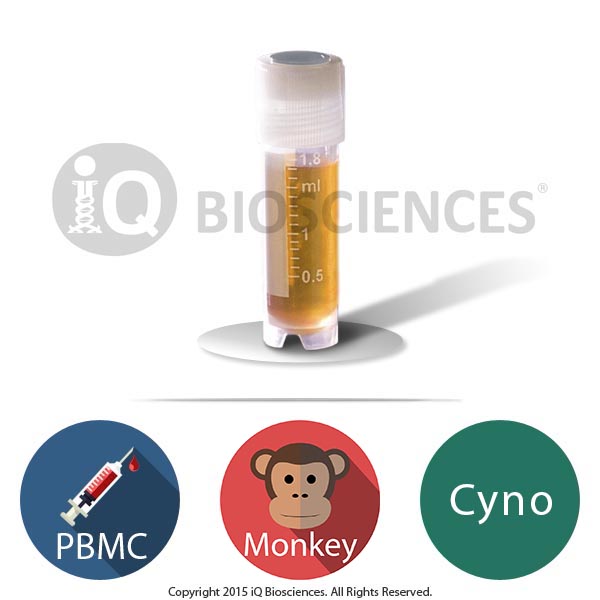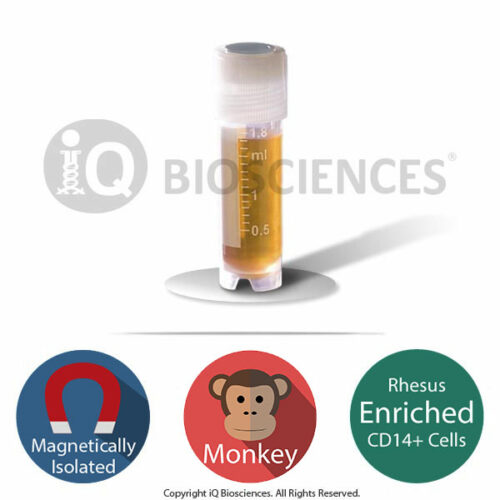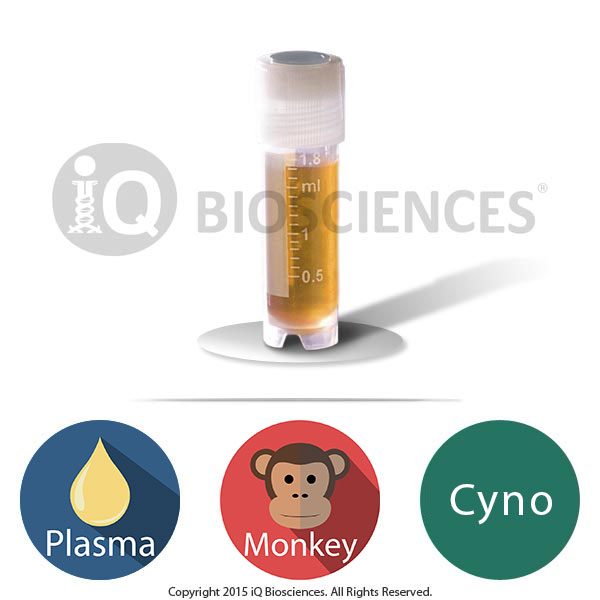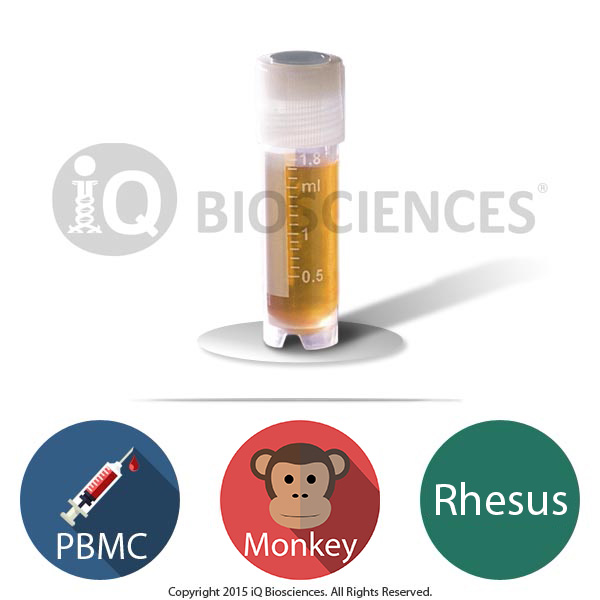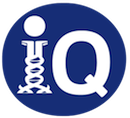- CD3 Pan T cells purified from rhesus macaque PBMCs by magnetic selection
- Used for a wide variety of safety assessment and functional assays
- Carefully cryopreserved to ensure high viability (> 90%) upon thawing
- All orders come with an iQ Certificate of Analysis
Purified Rhesus Macaque Monkey CD3 Pan T Cells
$920.00 – $1,620.00
- Description
- Additional information
- Donor Request
- Ethics
- iQ Experience
- Shipping Information
- Distributors
Description
About the Rhesus Monkey (or Rhesus Macaque)
The rhesus macaque is one of the most commonly utilized non-human primates in biomedical research. They are employed in numerous research areas, such as immunology, neuroscience, oncology, infectious disease, and toxicology due to their physiology.
Rhesus Macaque Monkey CD3 Pan T Cells
Rhesus CD3 pan T cells consist of both CD4 and CD8 T cells, and make up approximately 52-80% of PBMCs in a typical adult monkey. All T cells carry the CD3 protein marker and the T cell receptor (TCR), which recognizes foreign antigens presented by major histocompatibility complex molecules on antigen presenting cells to activate them.
T cells develop in the thymus to become mature CD4 or CD8 T cells and exit the thymus to reside and encounter foreign pathogens in lymphoid tissues.
When activated, CD4 T cells will become T helper subsets to secrete cytokines to boost either the humoral or cell-mediated immune response. In contrast, CD8 T cells, when stimulated, will become cytotoxic T cells that can lyse infected or transformed cells. Together, these two main subsets work to clear infections or diseased cells.
Pan T Cell Application Summary
Purified rhesus T cells are a good source of cells to study the biology of T cells and their role in the immune system. T cells are responsible for producing cytokines and performing cytotoxicity. Thus, pan T cells can be used for a variety of stimulation-dependent functional experiments to assess cytokine production, proliferation, and cytotoxicity.
With the current trend toward development of immuno-modulatory drugs, purified rhesus pan T cells are an ideal source of cells to test T cell response in the presence of therapeutic molecules. More importantly, rhesus T cells can be used to assess toxicity and safety characteristics of these biologics in the presence of T cell activation before first in-human trials. These cells are commonly employed in pre-clinical settings to ensure biologics are not eliciting unwanted functions, such as cytokine release and toxicity, specifically from T cells.
The negative isolation of pan T cells leaves them untouched without any antibody binding to cell surface markers that may influence function. This method leaves all cell surface proteins eligible to be bound to antibodies or other molecules for functional or population characterization studies.
In contrast, positive isolation of pan T cells may lead to internalization of the marker that was used to isolate the cells. In most cases, these markers are only used for identification purposes and may not have any effect on function, but it will depend on the organism and function. Therefore, cells isolated using this method may also be employed for functional or population characterization studies with the knowledge that the isolation marker may be internalized and not present.
Pan T Cell Purification
Collection of samples
Rhesus PBMCs were sourced from a responsible third party vendor that operate according to local regulations and laws.
Isolation of Rhesus CD3 Pan T cells
To enrich for rhesus CD3 pan T cells by the negative isolation method, PBMCs were incubated with antibodies against B cells, NK cells, dendritic cells, monocytes, granulocytes, and erythrocytes, and subsequently subjected to a magnet. Cells labeled with the antibodies bound to the magnet through the test tube wall, while unlabeled cells, the CD3 pan T cells, were decanted into a fresh tube to obtain the enriched population.
For the positive selection method, PBMCs were incubated in a test tube with antibodies against a pan T cell-specific marker and subsequently subjected to a magnet, similar to negative isolation. However, the cells that were decanted into the fresh test tube were the non-pan T cells, which can be used for other purposes, while the labeled pan T cells were left bound to the magnet through the test tube wall. The test tube was then removed from the magnet to release the purified pan T cells directly into the test tube.
Cryopreservation and storage
Purified CD3 pan T cells were cryopreserved carefully using iQ Biosciences’ cryopreservation protocol that ensures high viability (> 90%) after thawing.
Cells should be stored at < -120 °C once they are received, such as within a liquid nitrogen tank (vapor phase).
Additional information
| Available Size(s) | |
|---|---|
| Cell Type | |
| Format | |
| Species | |
| Tissue Type | |
| Viability | > 90% |
We are happy to accommodate the following donor requests if inventory is available. Feel free to inquire prior to ordering, or specify your interest in the "Order notes" section during checkout and we will follow-up with your shortly after your order is processed:
- Single or multiple donors for a particular product (SKU). Indicate number of vials from each individual donor
- Donor-matched PBMCs
- Donor(s) with a higher percentage of the cells of interest, i.e., B cells, CD14+ cells, CD4+ cells, CD8+ cells, or NK cells (for PBMC products only)
We are Committed to Ethical Practices
iQ Biosciences’ primary cell products from non-human primates are collected under approved IACUC protocol, which was developed in consultation with the Attending Veterinarian and is consistent with current veterinary standards. The collection facility is AAALACi and PHS accredited, and all animal housing, handling, and research protocols are consistent with standards set forth by the Animal Welfare Act, NIH's Policy on Humane Care and Use of Animals and the Guide for the Care and Use of Animals. All animal housing and handling is done in such a way to minimize stress and risk of injury to the animal.
For US customers, we ship via FedEx Overnight Shipping. Shipping charges will vary per shipping address (based on ZIP code) and are estimated to be $140.
For international (non-US) customers, we work closely with you and our couriers to ensure all necessary documentation is in place for international shipments to significantly reduce the chance of delays at Customs. For the export of non-human primate samples, this includes preparing CITES permits, as well as any other documentation as required by country. Please submit an inquiry to orders@iqbiosciences.com for your estimated time of delivery and shipping charges.
Austria
Hölzel Diagnostika Handels GmbH
Tel: +49 221 126 02 66
Email: info@hoelzel.de
Web: https://www.hoelzel-biotech.com/
Canada
Cedarlane
Tel: +1 (289) 288-0001
Toll Free (North America): +1 (800) 268-5058
Fax: +1 (289) 288-0020
Email: sales@cedarlanelabs.com
Web: https://www.cedarlanelabs.com
China
BIOHUB INTERNATIONAL TRADE CO., LTD.
上海起发实验试剂有限公司
Address: Chuansha Rd #6619, Pudong, Shanghai, Zipcode: 201200 P.R.China
Tel: 0086-021-50724187
Phone: +86-15921799099
Fax: 0086-021-50724961
Email: sale3@78bio.com
Web: www.qfbio.com
European Union
Caltag Medsystems Ltd.
Email: office@caltagmedsystems.co.uk
Web: https://www.caltagmedsystems.co.uk
tebu-bio
Web: https://www.tebu-bio.com
Or Find a local contact
Germany
Hölzel Diagnostika Handels GmbH
Tel: +49 221 126 02 66
Email: info@hoelzel.de
Web: https://www.hoelzel-biotech.com/
Zageno
Web: https://zageno.com/
Ireland
2B Scientific Ltd
Tel: +44(0) 1869 238033
Fax: +44(0) 1869 238034
Email: sales@2BScientific.com
Web: https://www.2bscientific.com
India
Cell & Gene BioSolutions Pvt. Ltd.
#478 C, SLV Complex, Raghavendra Swamy Mutt Road
Opp. Turahalli Water Tank, Turahalli, Subramanyapura Post
Uttarahalli Hobli, Bengaluru-560061, Karnataka, India
Phone: +91 97317 14670
Phone: +91 98809 25033
Email: info@cgbios.com
Web: www.cgbios.com
Japan
Cosmo Bio Co., Ltd.
Tel: +81 (03) 5632 9610
Fax: +81 (03) 5632 9619
Email: nsmail@cosmobio.co.jp
Web: https://www.cosmobio.co.jp
Qatar
Sedeer Medical Services and Trading LLC
Tel: +974 4434 9191
Email: info@sedeer.com
Web: https://sedeer.com/
Singapore
Omnicell Pte Ltd
Tel: +65 6747 0201
Email: enquiry@omnicell.com.sg
Web: https://omnicell.com.sg/</a
South Korea
BioClone
Tel: +82-2-2690-0058
Email: bioclone@bioclone.co.kr
Web: http://www.bioclone.co.kr
Switzerland
Hölzel Diagnostika Handels GmbH
Tel: +49 221 126 02 66
Email: info@hoelzel.de
Web: https://www.hoelzel-biotech.com/
Taiwan
Hycell International Co. Ltd.
Tel: +886-2-2877-1122
Fax: +886-2-2876-1520
Web: http://www.hycell.com.tw
United Kingdom
2B Scientific Ltd
Tel: +44(0) 1869 238033
Fax: +44(0) 1869 238034
Email: sales@2BScientific.com
Web: https://www.2bscientific.com
Caltag Medsystems Ltd.
Tel: +44 (0)1280 827460
Fax: +44 (0)1280 827466
Email: office@caltagmedsystems.co.uk
Web: https://www.caltagmedsystems.co.uk
tebu-bio
Tel: +44 (0)1733 421880
Fax: +44 (0)1733 421882
Email: uk@tebu-bio.com
Web: https://www.tebu-bio.com
Zageno
Web: https://zageno.com/
United States
Fisher Scientific
Tel: 1-800-766-7000
Web: https://www.fishersci.com
Quartzy
Web: https://www.quartzy.com
VWR International
Tel: 1-800-932-5000
Web: https://www.vwr.com
Zageno
Web: https://zageno.com/
